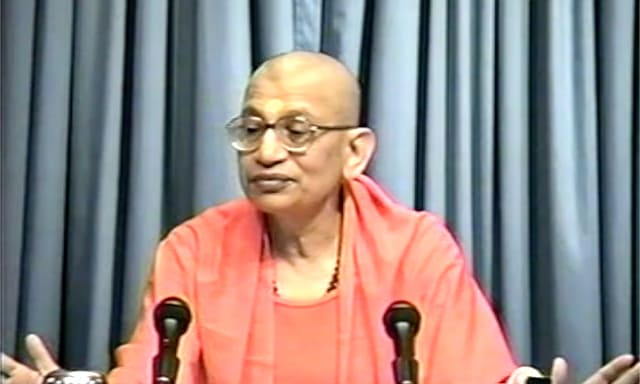Satsang with Sri Swami Viditatmananda Saraswati
Transcribed and edited by Malini and KK Davey.
Question
Can we communicate with our ātman and get divine guidance?
Answer
This question presupposes a duality that I am different from ātman. When we say ‘my atman; what is implicit is that ‘I am different’ and ‘my ātman is different.’ Ätman means ‘I’, it is not ‘my or our ātman’, rather it is, ‘I, the ātman.’ Don’t think that ātman is located in some place, such as the body or the heavens etc. Ätman is not an entity that is different from me. Is ātman somewhere, some place? What is the nature of I? I cannot communicate with ‘me’ because I am that. I can communicate with something that is other than me, so the question of communicating with me does not arise. The Self is saccidānanda, ever-existent, ever-shining, ever-full.
How do I communicate with myself? We can receive guidance from ourselves to the extent that as our mind becomes purer, our thoughts too get closer to reality. We always get messages from our heart, but the filtering medium is our mind. The self always expresses itself through the mind. The message that you hear will depend upon the disposition of your mind. The mind has the capacity to distort the message. When the mind is under the influence of tamas, then the message you get is dullness; you don’t want to do anything. When your mind is under the influence of rajas, then it gets the message to do this or to enjoy that. When it is sāttvik, you are happy, satisfied, and you are urged to know and discover. If the mind is under the influence of rajas or tamas the message gets distorted.
The message I get is that I am incomplete and that is because of the distortions of the mind when it is under the influence of rajas and tamas. When the mind is predominantly sāttvik the message is that I am happy, complete. Therefore, to get the proper message it is necessary for the mind to be sāttvik, free from attachments and aversions, free from impulses and reactions. In an abiding mind the messages are closer to the true nature of our self. The water can be pure but if the filter is dirty, it makes the water impure. The self is ever pure but if the mind is impure, the message also becomes impure. Therefore the purification of the mind is important, and the message received will be closer to our true nature.
Regarding divine guidance, while it is true that paramātma, or God, is our true Self, because of ignorance, we look upon God as different from our Self. Prayer and worship presupposes a duality between the Self and Īśvara. As long as I see Īśvara as different from myself, I seek the help and grace of Īśvara. How can we communicate with Īśvara and can we receive divine guidance from Īśvara? The answer is yes, we can communicate with our prayers and receive divine guidance by securing His grace. Let Him guide us by giving us the right kind of thoughts. There is a prayer in the last verse of Īśāvāsya Upanishad, “O Fire, please lead us to the right path!” Or the Gāyatré-mantra where we pray, “May the Lord guide our thoughts, elevate our thoughts, inspire our thoughts!” The grace of God is obtained by praying to God, worshiping God, serving God, and by pleasing God.




